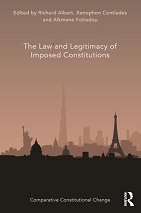Edited by Richard Albert, Xenophon Contiades, Alkmene Fotiadou (Routledge 2019, 266 pages)
Available now at https://www.routledge.com/The-Law-and-Legitimacy-of-Imposed-Constitutions/Albert-Contiades-Fotiadou/p/book/9781138488984
About the book
Constitutions are often seen as the product of the free will of a people exercising their constituent power. This, however, is not always the case, particularly when it comes to ‘imposed constitutions’. In recent years there has been renewed interest in the idea of imposition in constitutional design, but the literature does not yet provide a comprehensive resource to understand the meanings, causes and consequences of an imposed constitution.
This volume examines the theoretical and practical questions emerging from what scholars have described as an imposed constitution. A diverse group of contributors interrogates the theory, forms and applications of imposed constitutions with the aim of refining our understanding of this variation on constitution-making. Divided into three parts, this book first considers the conceptualization of imposed constitutions, suggesting definitions, or corrections to the definition, of what exactly an imposed constitution is. The contributors then go on to explore the various ways in which constitutions are, and can be, imposed. The collection concludes by considering imposed constitutions that are currently in place in a number of polities worldwide, problematizing the consequences their imposition has caused. Cases are drawn from a broad range of countries with examples at both the national and supranational level.
This book addresses some of the most important issues discussed in contemporary constitutional law: the relationship between constituent and constituted power, the source of constitutional legitimacy, the challenge of foreign and expert intervention and the role of comparative constitutional studies in constitution-making. The volume will be a valuable resource for those interested in the phenomenon of imposed constitutionalism as well as anyone interested in the current trends in the study of comparative constitutional law.
About the series
Comparative Constitutional Change has developed into a distinct field of constitutional law. It encompasses the study of constitutions through the way they change and covers a wide scope of topics and methodologies. Books in this series include work on developments in the functions of the constitution, the organization of powers and the protection of rights, as well as research that focuses on formal amendment rules and the relation between constituent and constituted power. The series includes comparative approaches along with books that focus on single jurisdictions, and brings together research monographs and edited collections which allow the expression of different schools of thought. While the focus is primarily on law, where relevant the series may also include political science, historical, philosophical and empirical approaches that explore constitutional change.
Xenophon Contiades is Professor of Public Law, School of Social and Political Sciences, University of Peloponnese and Director of the Centre for European Constitutional Law-Themistocles and Dimitris Tsatsos Foundation, Athens, Greece.
Thomas Fleiner is Emeritus Professor of Law at the University of Fribourg, Switzerland. He teaches and researches in the areas of Federalism, Rule of Law, Multicultural State; Comparative Administrative and Constitutional Law; Political Theory and Philosophy; Swiss Constitutional and Administrative Law; and Legislative Drafting. He has published widely in these and related areas.
Alkmene Fotiadou is Research Associate at the Centre for European Constitutional Law, Athens.
Richard Albert is Professor of Law and Nicholson Scholar at Boston College Law School.
